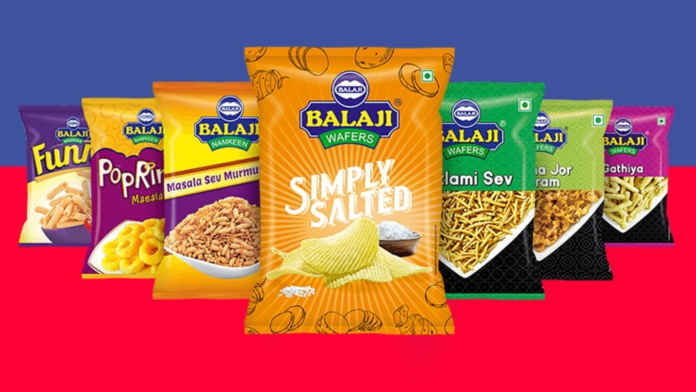Balaji Wafers, the regional snacking company that attracted attention from multinationals like PepsiCo for a potential acquisition, has successfully surpassed the INR 5,000-crore annual sales mark in the fiscal year ending March 2023.
In the fiscal year 2023, the Rajkot-based company recorded sales totaling INR 5,010 crore, marking a significant 24% increase compared to the INR 4,034 crore reported in the previous year.
Contrastingly, Jubilant Foodworks, the company overseeing Domino’s Pizza, Dunkin’ Donuts, and Popeyes restaurants, reported sales of INR 5,158 crore in the fiscal year 2023. Meanwhile, Nestle’s division specializing in prepared dishes and cooking aids, featuring Maggi noodles, sauces, seasonings, pasta, and cereals, achieved annual sales of INR 5,300 crore. Notably, Balaji, with its focus on potato chips, bhujia, and namkeens, operates primarily in fewer than a dozen states, predominantly in the western regions such as Gujarat, Maharashtra, and Rajasthan. Despite this limited geographic reach, it commands an estimated 65% share of the organized market in these areas.
In FY23, the company experienced a substantial surge in net profit, reaching INR 409 crore, a remarkable increase from the INR 7.2 crore recorded in the preceding year. This impressive growth comes in the wake of unprecedented spikes in costs related to edible oil, logistics, and packaging, which significantly impacted its margins during the prior period.
“Our profits were always in the vicinity of 8-9% of our total sales but the two years of pandemic were an exception when we didn’t hike prices despite key raw materials and logistics costs doubling, wiping out our entire margins,” said Chandubhai Virani who cofounded Balaji with his two brothers Bhikubhai and Kanubhai in 1982.
“In FY23, profit is back to normal as edible prices have nearly halved while other input costs have come down too,” he said. “We also lost senior employees with high salaries to competition in FY22, which reduced our staff cost last year.”
The company, which initially began as a supplier of snacks at a movie theatre four decades ago, has witnessed a remarkable increase in sales of over twofold since the onset of the pandemic. Currently standing as the third-largest player in India’s INR 43,800-crore salty snacks market with a 12% share, it follows Haldiram’s with 21% and PepsiCo with 15%. Notably, as a single brand, Balaji has now outgrown each of PepsiCo’s brands in this sector, surpassing both Lay’s and Kurkure.
“We don’t compete on pricing as our products are significantly cheaper than rivals,” shared Virani, 66, in a Gujarati accent devoid of any polished management rhetoric. “We don’t even have a sales target and just chase demand for high quality and affordable priced products.”
Illustrating this is the fact that Balaji’s ’10 pack of salted potato chips contains 35 grams, while PepsiCo Lay’s provides 23 grams for the identical price.
The Balaji model, which has proven successful thus far, is fundamentally centered around offering products at a 20-30% discount compared to national brands. This strategy ensures consistent volumes through the benefits of economies of scale. The company also exercises tight control over almost every facet of operations, managing a substantial portion of manufacturing in-house across its four factories. Remarkably, the Balaji model thrives with minimal reliance on advertising and promotion.
While most FMCG makers allocate 8-12% of their annual sales to Advertising and Promotion (A&P) expenses, Balaji kept its A&P cost to less than 2% in the last fiscal year, contributing to reduced overheads.
Rivals agree. “The biggest USP of Balaji has been low pricing and in snacking affordability is the biggest factor for consumers who seek value for money,” said Krishnarao Buddha, senior category head – marketing at Parle Products.





